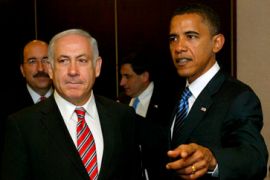US and Israel at odds
The allies differ over their approaches to Iran and peace with the Palestinians.

 |
| Netanyahu is still to commit to a two-state solution with the Palestinians [AFP] |
Differences over how to deal with Iran are likely to dominate Tuesday’s meeting between Barack Obama, the US president, and Binyamin Netanyahu, the Israeli prime minister, at the White House on May 18.
Obama has taken a softer line on Iran’s alleged nuclear ambitions, emphasising diplomacy over sabre-rattling and threats of military action.
Further, the Obama administration wants Netanyahu to engage with the Palestinians and work quickly towards a two-state solution as a way of defusing the perceived threat from Tehran.
Netanyahu has shown little interest in reviving dialogue with the Palestinians and has still not endorsed a two-state solution.
He has made clear he considers Iran the primary challenge to Israel’s existence and has indicated he will not stand by passively while Iran acquires nuclear capability.
Netanyahu wants to deal with Iran first, then hold talks with the Palestinians; Obama has his priorities the other way around.
Restoring balance
The George Bush-era attitude towards Israel has changed markedly since Obama took office.
In 2001, Bush made Israel’s Ariel Sharon one of his earliest guests at the White House. He gave Sharon a free hand in everything the hawkish Israeli leader wanted, from attacking towns in the occupied territories to building the infamous separation barrier.
 |
| Obama chose to receive Jordan’s King Abdullah before Israel’s new president [EPA] |
Obama will be less accommodating to Israel. While he makes the ritual pledges of support for Israel demanded by the powerful pro-Israel political lobby, he has taken steps to restore some balance.
He has made an Arab-Israeli peace deal a top foreign policy priority. He reached out early and often to Arab leaders and had Jordanian King Abdullah to the White House weeks before Netanyahu.
His envoy, George Mitchell, has made three trips to the region, pressing Israel to freeze settlement-building on occupied Arab land. Mitchell is trying to convince Arab leaders to offer Israel recognition and security assurances as an inducement to make peace.
Most notably, Joe Biden, the US vice-president, startled the American Israel Public Affairs Committee (Aipac) annual gathering recently with a tough speech.
“Israel has to work for a two state-solution,” he told the leading pro-Israel lobby group. “You’re not going to like my saying this, but not build more settlements, dismantle existing outposts and allow Palestinians freedom of movement … and access to economic opportunity.”
The shifting priorities could lead to the most serious clash in the 61-year history of US-Israeli relations.
Netanyahu clashed with Bill Clinton, the Democrat president, in the 1990s.
At one meeting, so the story goes, Netanyahu’s strident lecture on the history of the Arab-Israeli conflict so angered Clinton that he let loose a string of obscenities after the Israeli leader left.
Leverage
The question is, how much leverage does Obama have with Netanyahu?
US military and economic aid to Israel appears to be sacrosanct. Few members of congress would countenance any reduction of the flow of money or any link between aid and a cessation of Israeli settlement-building and land-grabbing.
But Netanyahu is a politician first and last. He has a shaky coalition government, and has aleady suffered political damage over his mishandling of the debate on the Israeli budget.
And he is nowhere near as popular as Obama.
If Obama can appeal over Netanyahu’s head to the Israeli public, showing them a convincing path to peace through recognition and security guarantees from Arab governments in return for a Palestinian state, Netanyahu would have no choice but to bow to public opinion.